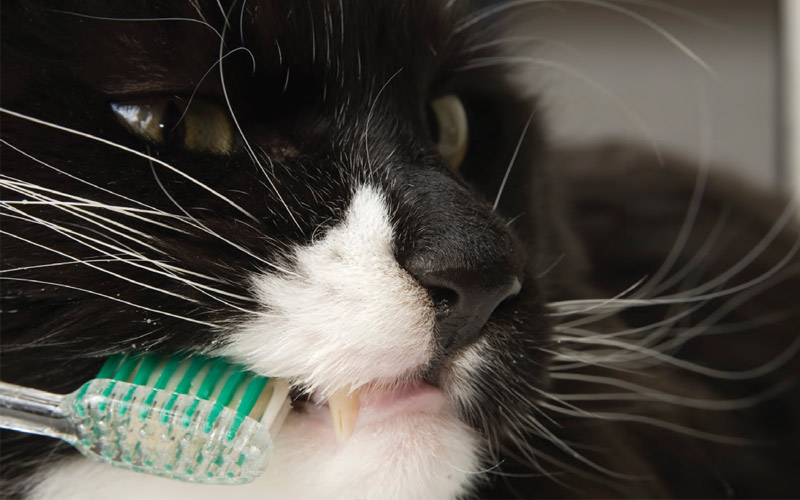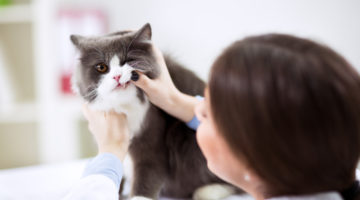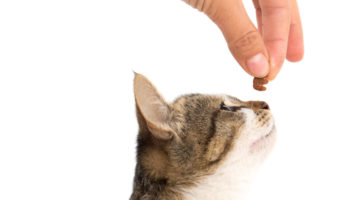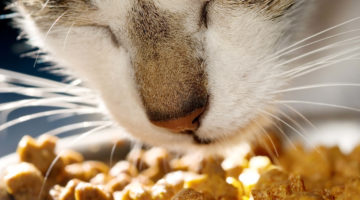Domestic cats may lead pampered lives, but dental problems are a major issue for them, especially as they get older. Yet plaque, calculus and periodontal disease are almost non-existent in wild felines. Ever wonder why?
The major reason is diet. Wild cats must catch and kill their prey. They then eat the prey – raw! The tough stringy muscle contains enzymes to break down plaque and tartar, while chewing raw bones creates friction on the teeth and cleans like a rough toothbrush. Sustained chewing of raw meat and bones also increases levels of salivary enzymes that help kill bacteria and plaque as they form.
Now compare this to the average household kitty diet. How many cats even fail to chew their food, swallowing big mouthfuls at a time? (This is the most common cause of vomiting food immediately after eating!) Poor quality canned food is soft and mushy, thus creating no friction for the teeth. It is also generally laden with sugar, to make
all those low end ingredients taste good.
Even if offered bones, rare is the cat who will chew and gnaw on them like a dog. And contrary to popular believe, most dry foods and treats don’t keep teeth clean. Most treats are gone in a few seconds, barely chewed. Good quality dry food is helpful, but again, sustained chewing is needed to create the necessary enzyme action. So what can you do? Follow these four steps to improve and maintain your feline friend’s dental wellness.
Brushing tip
Keep the mouth closed with one hand.
Slip your finger in between the cheek
and gum and brush. Your cat
will fight you less, plus you won’t
get accidentally bitten!
1 If your cat already has bad teeth, get them cleaned professionally. Not only will his breath smell better(thus giving you a more enjoyable “cat in your lap” experience), but it will improve his overall health and potentially prevent secondary problems.
2 Feed a good quality diet, and add some large chunks of raw or barely cooked meat to the food. (Some cats do want their food “warm” in order to find it flavorful.) Do not cut the meat up into tiny pieces. This defeats the purpose of sustained chewing action. In any case, your cat’s teeth are sharper than any knife for slicing and dicing food!
Sustained chewing of raw meat and bones increases levels of salivary enzymes that help kill bacteria and plaque as they form.
3Products are available that make dental care a breeze. Biotene makes an enzyme spray that you spritz into the cat’s mouth. It mixes with the saliva and degrades tartar. Leba III is a herbal spray that works in a similar way. Oxyfresh and Biotene both make a solution that you can add to your cat’s water. When he drinks, it acts like mouthwash and releases its enzymatic/cleaning action.
4Believe it or not, with training, most cats will let you (albeit begrudgingly) brush their teeth. Small brushes that fit over your finger work the best, in my opinion, as you can then “feel” where you are in the mouth and brush problem areas better. What if you notice bleeding as you’re brushing? Should you stop? No. If there’s any bleeding, the cat already has a problem, and that means you should continue brushing (though more gently) until the bleeding quits. If the bleeding doesn’t stop after a few days, the cat has a more serious problem and should be taken to the veterinarian.
If you’ve ever had a toothache or sore gums, you know how nasty it feels. A cat with dental disease feels the same way. Paying attention to his teeth and gums will not only keep him healthier, but will also help him feel a lot better.
Why it’s important
Dental cleaning is not just about having white teeth and fresh breath. periodontal disease can lead to tooth loss and root abscesses, and can be very painful and uncomfortable. as well, bacteria from a diseased mouth can spread through the body via the bloodstream and lead to secondary bacterial infections of the liver and kidneys, or even endocarditis, where the bacteria “nest” on the valves of the heart. this creates problems with blood flow (heard as a murmer with a stethoscope), and if left untreated can lead to permanent valve and heart damage. signs of dental disease include:
- bad breath
- bleeding gums
- reluctance to chew hard food
- reluctance to let you open the mouth (pain)
- rubbing the face with paws or against the floor







No Comment